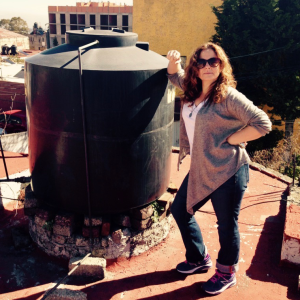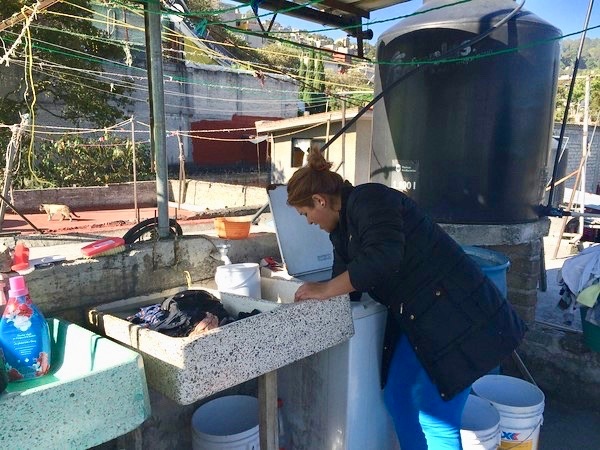Water Insecurity and Gender in Mexico City


In January, Professor Elizabeth Roberts (Anthropology, IRWG Affiliate Faculty) and her research team began fieldwork in Mexico City. The fieldwork is part of her “Neighborhood Environments as Socio-Techno-bio Systems: Water Quality, Public Trust, and Health in Mexico City (NESTSMX),” an NSF-funded four-year collaborative interdisciplinary project that brings together expertise from anthropology, environmental engineering, and environmental health from the University of Michigan and the Instituto Nacional de Salud Pública in Mexico to examine how neighborhood and household water insecurity contribute to social, gendered, environmental, and health inequalities in Mexico City.
The NESTSMX research involves ethnographic and environmental engineering fieldwork with families, especially mothers and grandmothers, focused on the infrastructures and social structures that move water in and out of neighborhoods, households, and bodies. The NESTSMX research team is now conducting “water audits” in sixty households in fifteen different neighborhoods throughout the city. The audits include household water quality sampling, installation of real time water sensors and collecting participants biological samples.
All of this data is complemented with in-depth ethnographic interviews with families about their access to and use of water, including the water trust or distrust, water insecurity, household water storage capacity and water contamination The team will combine this data with bio-marker data gathered from these same families over the last 25 years through the environmental health project called ELEMENT. The combination of all this data will allow the NESTSMX team to ask multidisciplinary questions about how water insecurity affects health and to gain a better understanding of what it would take to restore trust in tap water for drinking.
So far, the NESTSMX team has found that intermittent water supply is one of the biggest issues facing many households in working class neighborhoods throughout the city. This issue disproportionately affects women who need to manage their household water supply so that other household members can get to work and school both bathed and fed.
Sometimes women in charge of this domestic management have to get up in the middle of night when the water arrives and they often forego bathing so others can have enough water to leave the house. They are also responsible for making sure the household doesn’t run out of water and for deciding which water related activities they forego if there is no water coming in. For instance: don't mop, don't wash clothes, do cook, do boil water, do use disposable plates and cups.
The NESTSMX water audits in the 60 households will allow the research team to develop a research instrument for application to all 800 ELEMENT families that will provide more detailed knowledge about how water insecurity affects health in megacities today, especially for women.


photos (L-R): household water storage in buckets; Laundry on the rooftop, next to the household tinaco (rooftop water storage), April 2015. Courtesy of NESTSMX study.
Learn more about the project on the Mexican Exposures project website.
IRWG supported the early stages of this project through a 2017 Sisters Fund for Global Health grant, Called “Gendered Environments: Making Global Health Knowledge in Working-Class Mexico City Neighborhoods” as well as through recent research development support in Dr. Roberts’ efforts to seek additional extramural funding. Learn more about IRWG’s Research Development services.
